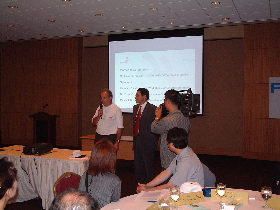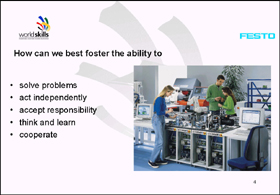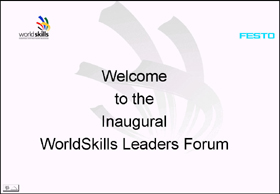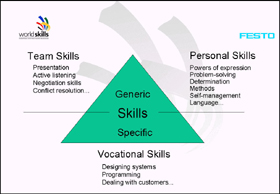Seoul Leaders Forum
Ladies and Gentlemen,
Thankyou for giving me the opportunity to address you in my home country at this Inaugural WorldSkills Leaders Forum. I would like to briefly outline key trends and challenges that face us in the world of skills in industry.
The first trend is the systematic implementation of Manufacturing Excellence strategies such TPM, JIT and TPS. Don’t worry - you don’t need to know what those letters mean! It is enough to know that these strategies aim to enhance productivity - by creating a creating a balance between the three components - People, Technology and Organisation.
Implementing these strategies has demanded a radical change in thinking on the shopfloor resulting in the spread of ‘high-involvement’ and team-oriented work practices where
- operators take ownership of their equipment and accept responsibility for its maintenance and performance
- technicians are freed up to improve productivity, reduce complexity and cut costs
This is major change – to succeed all personnel must participate fully - accepting responsibility and taking the
initiative.
There is a huge requirement for new forms of training here, since it represents a considerable change in attitude – and this is the second trend.
This development has led to a growing importance of personal and team skills.

Introducing Dr Yi
A third trend is that training has become much more focussed. There is a move entrepreneurial away from content-oriented courses towards customised training focussing on the transfer of selected competencies. But today people need a complex set of competencies: See slide on right (click slide to enlarge).
Here you can see the vocational skills – whether for a Mechatronics technician, a bank clerk or a nurse – at the bottom.
But look at the personal and team skills. These skills are not only beneficial on the shopfloor or in a hospital – they make better citizens who can accept responsibility, negotiate effectively and so on.
And this is our fourth trend: training has changed from the purely technical training of the 80´s and 90´s to training that addresses the development of these skills.
How can we foster these skills?
We apply a simple checklist. Whether the "training" is a short presentation or a one-year course in control technology, we always ask ourselves how can we best foster the ability to:
See slide on right (click slide to enlarge)
- solve problems
- act independently
- accept responsibility
- think and learn...the personal skills ...and
- cooperate
- communicate...the team skills.
This obviously goes far beyond the scope of traditional technical training – and to meet this challenge we need 3 things:
- Firstly - suitably designed hardware, software and courseware
- Secondly - training methods that target the technical skills, while fostering personal and team skills
- And thirdly professional facilitators that can develop, pioneer and handle innovative training methods:
And do you know what the exciting thing is?! We find we can train the technical outcomes even better using methods that address the team and personal skills, making training more effective and much more fun for all concerned. Let’s look at a couple of examples:
The Mechatronics Competition you see here today is a reflection of that training - an intensive learning environment where competitors learn precisely the competencies they need to master their jobs.
In the competition they work as a team, but both of them master the mechanical, electronic and informatics components of Mechatronics. This is the way they work - and continuously learn - on the shopfloor.
The Manufacturing Team Challenge is a courageous experiment to test an innovative form of competition – where a team of craftspeople work together to achieve a common goal.
MTC includes design of a product and the production equipment with dollars as the main criterion. This is important – entrepreneurial tradespeople must not only master their trades, they must get find and handle business.
What does the visitor at the WorldSkills Competition think about all this? Both competitions present trades in a highly attractive way – young people understand what is going on, and can see teams enjoying the challenge. The professional visitor recognises the most intense and effective form of learning imaginable!
Festo has supported the WorldSkills competition since the first Mechatronics competition in 1991 in Amsterdam. There two teams took part - today you can see 20 world class Mechatronics teams Going For Gold!
We have teamed up with WorldSkills because we see a highly beneficial symbiosis between our two organisations. We are determined to build our mutual network, and increase activities and services on a continuous basis – making best use of the time between the competition and WorldSkills Leaders Forum every 2 years!
And here is our fifth trend, ladies and gentlemen – networking! We encourage you to join us in this venture. Believe me - you have nothing to lose. It’s like the WorldSkills competition itself:
"If you take part – you will always win!"
Thank you


